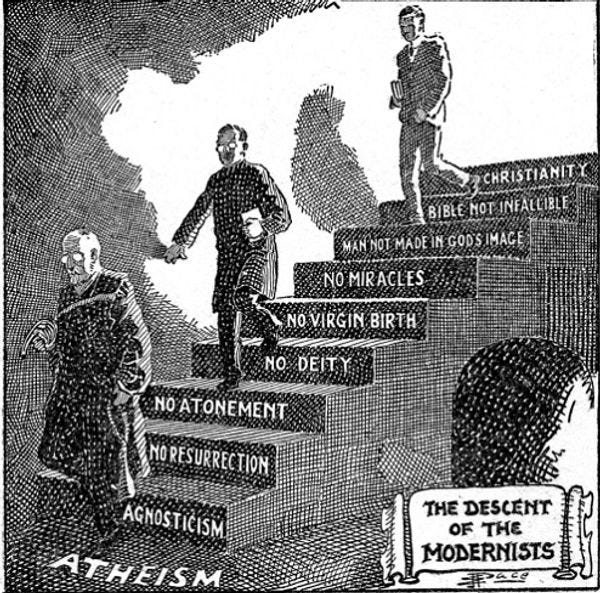Sundays With The Christianists: American History Textbooks To Shield Your Homeschooled Darlings From Dangerous Modern Thinking
Time to round out our visit to the turn of the 20th Century -- as seen through the lens of rightwing Christian textbooks -- with a brief discussion of the dangerous ideas that began infecting the world in the late 19th century. Persons prone to the vapors may wish to have a couch and some smelling salts handy. For our 8th-grade textbook from A Beka, America: Land I Love, the last years of the 19th century were a terrific time when Christian revival and missions had "improved the moral health of America and many other nations." Unfortunately, history is not merely the study of world events; it is also the study of how incorporeal beings become personally involved in those events:
Homes, churches, schools, businesses, and government agencies also upheld and promoted Christian values and virtues. But Satan counter-moved the spiritual influences in America by raising up false, anti-Biblical philosophies that would eventually erode our Christian heritage. He "hatched" the ideas of Modernism (religious liberalism), evolution, Marxist-socialism (Communism), progressive education, and modern psychology in the latter half of the 19th century, but they did not affect society until the 20th century and did not come into full bloom until the latter half of the 20th century.
Our 11th/12th-grade textbook, United States History for Christian Schools (Bob Jones University Press, 2001), is similarly displeased by newfangled thinking, but doesn't directly attribute evolution or psychology to Satan himself -- parents homeschooling their high school-aged kids may therefore want to select Pensacola Christian College, the publishers of A Beka Books, over those wild-eyed radicals at Bob Jones, with their "anything goes" doctrine.
Now, when these guys talk about "modernism," they do not mean the artistic/architectural/literary movement that comes to mind for most of us secular readers; instead, they mean theological modernism, or more succinctly, "stuff fundamentalists don't like." And of course, as Land I Love puts it, modernism is less a philosophical position than a rebellion against God by prideful Man:
Modernism began in German universities when German theologians began to exalt their own reason above God’s Word, teaching that the Bible was a collection of myths, legends, and a few historical facts. They denied the existence of Heaven, Hell, and the sin nature, insisting that Jesus was not the Savior of man but only a great man whose teachings could help men evolve into perfect beings. The German modernists introduced the word evolution to the academic vocabulary.
U.S. History is just as vehement in its condemnation of treating the Bible as if it were just another ancient text, because you just don't do that:
Modernism applied Darwinian evolution to Christianity and ended up with a system of belief that was completely anti-Christian. For instance, modernists rejected the idea that Moses wrote the first five books of the Old Testament (Genesis through Deuteronomy). Instead, they contended, the Israelites preserved a series of stories, legends, and myths. Supposedly the priests and royal scribes gradually shaped these into the Biblical books that we know today, an evolutionary process which was completed after the Babylonian captivity of Israel (c. 450 B.C.).
Anybody knows that Moses wrote those texts, because that's simply the truth, regardless of what other research may suggest. Yeesh, this is not hard, guys. Oh, but it gets far worse, as the diagram up top shows:
Modernists, therefore, denied Biblical teachings such as the deity of Christ, His virgin birth, atonement for sin through His blood, and the inspiration of the Bible. Modernists gained a foothold first in American colleges and seminaries and soon began to spread their teachings to American pulpits.
U.S. History adds a second worrisome doctrine to the list of ideas to be shunned, the dangerously commie-sounding "social gospel":
The social gospel replaced the regeneration of the individual with the "regeneration" of society through social reform. Although some of these reforms were worthwhile, advocates of the social gospel joined with the modernists in rejecting the teachings of orthodox Christianity ... [these reformers were] correct in saying that Christ was always touched with compassion when He saw hunger, poverty, and suffering. They were wrong, however, when they made Jesus merely a social reformer and lost sight of His more important work in the souls of men. Social reform can never suffice when man’s basic need of salvation from his sin is not met.
And here we have a defining plank in the conservative Christianist platform: Feeding and housing the Poors is nice and all, but let's not get carried away -- that stuff is worthless if they're allowed to go on believing the wrong things. Also, cutting food stamps is not inconsistent with Christianity, because Jesus was not a government agency.
We won't bother with the books' attacks on Darwin, since there's nothing all that new in these sections -- it's mostly just a condensed and simplified version of the "Darwin wuz evil" section that A Beka throws at 10th-graders in their World History text. Same goes for their brief dismissal of Marx; lord knows we'll be hearing more about him later.
Both texts do spend a good bit of energy trashing John Dewey and progressive education. Land I Love has this wonderfully cartoonish overview, which sounds like it may have been cribbed from some pamphlet written in the 1970s:
John Dewey, an atheist who believed that man was an animal and solely the product of his environment, integrated the philosophy of evolution into the American educational system. Dewey emphasized permissiveness (do your own thing) in the classroom, saying that children learned best when allowed to follow their own instincts. He stressed social adjustment rather than academic learning. According to progressive education, problems are a result of social environment; this philosophy eliminates individual accountability and responsibility. Progressive education eventually led to the breakdown of academic and moral standards in American schools in the latter half of the 20th century.
Who destroyed America? John Dewey, that "do your own thing" hippie. Yes, that Dewey. Case closed. U.S. History is only slightly less dismissive:
Progressive educators aimed at improving education by relating learning to the child’s interests... [and believed that] education should also be based on experience rather than simple memorization; therefore, activities such as laboratory experiments and field trips became part of the educational process ... [But progressive education doesn't recognize that] some necessary components of basic education, such as the multiplication table, can be learned only by rote memorization, regardless of whether they are relevant to student interest.
Worse, Dewey was philosophically unsound himself, because he
was a major leader in the twentieth-century movement known as secular humanism. Secular humanism denies the existence of God and affirms the goodness and perfectibility of man. This philosophy replaces absolute standards of truth and morality with relative, pragmatic standards based on human experience (i.e., "whatever works is right"). Obviously, the Christian must reject such a system.
The editors of U.S. History helpfully make it clear what decade their anger at public schools is rooted in, at least:
Ironically, public discontent over progressive education was based on the progressives’ own results-oriented standard. Much of the criticism which arose in the 1950s resulted from the realization that progressive education had simply not done a good job of educating America’s children.
And nothing has changed since then, of course; Johnny still can't read, so we need to punish teachers and privatize the whole system, obviously. A continuous education crisis is good for Christian schools.
Both books end their chapters on Progressivism in remarkably similar terms. Land I Love foreshadows the coming Culture Wars that would result in the publication of textbooks like Land I Love:
Most Americans held to Biblical morality throughout the 19th century and most of the 20th century. However, as liberal professors in universities and seminaries began to promote Modernism, evolution, Communism, progressive education, and modern psychology, these false philosophies slowly began to permeate the American educational scene and some churches. In time, they would have a devastating effect upon American life.
U.S. History takes a bit longer to arrive at essentially the same place, explaining that Progressives had some good ideas, like clean food and drugs, but at the cost of enlarging government power. The worstest error of progressivism, they say, is its blindness to the fundamentally sinful nature of Man, which is a rather surprising claim, seeing as how laws reining in the excesses of 19th century capitalism and corrupt government were pretty much rooted in the assumption that people would try to get away with doing terrible things if they could. Similarly, the book insists that progressives believe that people and society will inevitably get better, which again doesn't ring true for a movement that used muckraking journalism to call attention to just how awful people can be. U.S. History closes its chapter with a critique of progressives' "false solutions to man’s problems":
They believed that through education, improving living conditions, and providing more equal political and economic opportunity, they could solve man’s difficulties. Such a position ignores the Biblical teaching that man’s basic problem is not his ignorance or his environment; it is his sin -- a problem which can be remedied only through forgiveness and cleansing by God through the death and resurrection of Christ.
Yeppers, that's definitely a terrific blueprint for governing a country with a secular Constitution and a whole bunch of different religions.
***********************************

On a somewhat related note, televangelist Paul Crouch, the founder of the Trinity Broadcast Network (pictured above giving the finger to his camera crew in a reportedly undoctored photo), died Saturdayat the age of 79. Crouch built a broadcasting empire and well-beyond-comfortable lifestyle on viewers' "love offerings," and his enthusiasm for the Lord led some jealous souls to sue him and his hyper-bouffanted wife Jan over important ministerial purchases like a $100,000 motorhome for their dogs , plus there was that one time when Crouch paid a gentleman friend $450,000 to just shut up about the gay sex already.
Yr Doktor Zoom's favorite Paul Crouch memory: during a visit to Israel in the 80s, we think, Crouch saw an IDF armored personnel carrier trundling down the road and practically creamed his pants at the possibility that a bunch of Israeli draftees driving around on a routine patrol might -- just might -- represent the arrival of the Battle of Armageddon. "Could this be it? Could this tank fire the first shots of the Final Battle?" He was quite the huckster. Thanks to alert commenter Steverino for the tip.
[ LA Times ]




I sympathize with your frustration as far as a childless man can, but I'm not sure what skills would help. It took Whitehead and Russell until page 86 of Vol II to prove that 1 + 1 = 2, so working it out from first principles may not be feasible.
Did Adam get around to clearing up the small matter of when the rest of the critters were made? Genesis I says before Adam, Genesis II says afterwards. (It just seems like something the iiteral Truthers <i>ought</i> to take an interest in.)